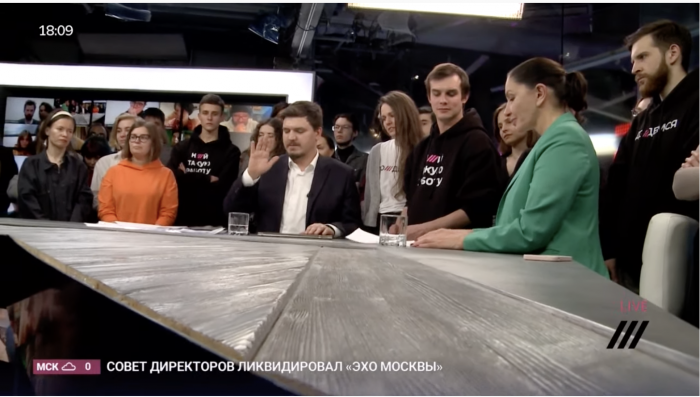
Russia claims the outlets are “guilty of violating a ban on calling the war a war, the invasion an invasion, and the aggression aggression,” Masha Gessen wrote in The New Yorker on Wednesday.
TV Rain released its final broadcast (for now, anyway — the station said it’s “temporarily suspending” its work) on Thursday. You can watch it on YouTube here, unless you’re in Russia, which has also blocked TV Rain’s YouTube channel.
Echo of Moscow is also shutting down. And the Russian government warned Voice of America on Wednesday that it would block its Russian website unless it removes coverage of the invasion of Ukraine. (Voice of America said it would not comply.)
Many of TV Rain’s editorial staffers have left Russia, CNN reported on Thursday.
“Our audience is huge, and we have a responsibility for them,” TV Rain’s editor-in-chief, Tikhon Dzyadko, had told CNN on Tuesday. “But also we have responsibility for our families.” TV Rain had 6.2 million monthly active users, according to its media kit (and some help for me from Google Translate), and at least 80,000 paid subscribers to a premium package that included access to a closed Telegram channel and Facebook group.TV Rain’s website, and all of its social media posts and YouTube videos, are currently appended with large banners warning that “THIS MESSAGE/MATERIAL WAS CREATED AND/OR DISSEMINATED BY A FOREIGN MEDIA OUTLET ACTING AS A FOREIGN AGENT AND/OR A RUSSIAN LEGAL ENTITY ACTING AS A FOREIGN AGENT.”
❗️Телеканал Дождь временно приостанавливает свою работу
«Нам нужны силы, чтобы выдохнуть и понять, как работать дальше. Мы очень надеемся, что мы вернемся в эфир и продолжим работу»», — сказала в эфире Дождя гендиректор Наталья Синдеева pic.twitter.com/Lj9enw9EZV
— Дождь (@tvrain) March 3, 2022
The station’s last broadcast ended with footage from Tchaikovsky’s Swan Lake:
On August 19, 1991, when the ultra-conservative putschists sent tanks into Moscow to stop perestroika and the collapse of the USSR, Soviet TV was too shocked to know what to show. So they showed “Swan Lake.” It’s what @tvrain broadcast after their last broadcast. @EvgenyFeldman pic.twitter.com/1CD6k3IyQ2
— Julia Ioffe (@juliaioffe) March 3, 2022
In 2016, Shan Wang wrote for Nieman Lab about how TV Rain saw subscriptions as its future. Here’s a bit from her piece:
In 2014, [TV Rain] launched a full-fledged subscription campaign, with renewed urgency.
“When we were kicked out of all the major networks in Russia, we probably wouldn’t have made it, we probably wouldn’t exist, wouldn’t be sitting in front of you right now,” Ilya Klishin, editor-in-chief of TV Rain’s website, said. “Really, this was pretty much the only source that could help us go through.”
TV Rain now has more than 70,000 paying subscribers who pay for access to its flagship programs, news shows, special long reports, and live broadcasts, which TV Rain will sometimes open up to everyone in special cases, such as terrorist attacks. Paywalled videos certainly don’t handle Putin’s reputation with kid gloves: this investigation into his personal chef, for instance, or a piece on “Kremlin chroniclers,” journalists who traveled with Putin. It’s reported from Donbass in Eastern Ukraine. But Klishin emphasized that he doesn’t want the site to be described as “oppositionist,” he said, because “that’s what we’re called by our critics in the government,” and “we want to give both sides a place to talk” (though admittedly, getting government officials to come on TV Rain programs willingly has gotten harder).
Beyond special coverage, there are other special perks to membership, including a closed Facebook group where subscribers can pose questions and discuss coverage with TV Rain journalists directly. Commenting on all platforms are also open only to subscribers. A year-long subscription costs 4,800 rubles (about $73 at the time this story was published), though it’s currently running a summer offer of 3,800 rubles for a year. One-month and three-month options are also available.
As of Thursday, TV Rain charged 5,800 rubles per year (about $54 at the time this story was published, as the ruble has fallen precipitously since the start of the current crisis) or 680 rubles ($6.35) per month for its premium subscription.
ААААААА @tvrain
Они реально это сделали pic.twitter.com/ykWEc7AacM— Велик (@annavellikok) March 3, 2022